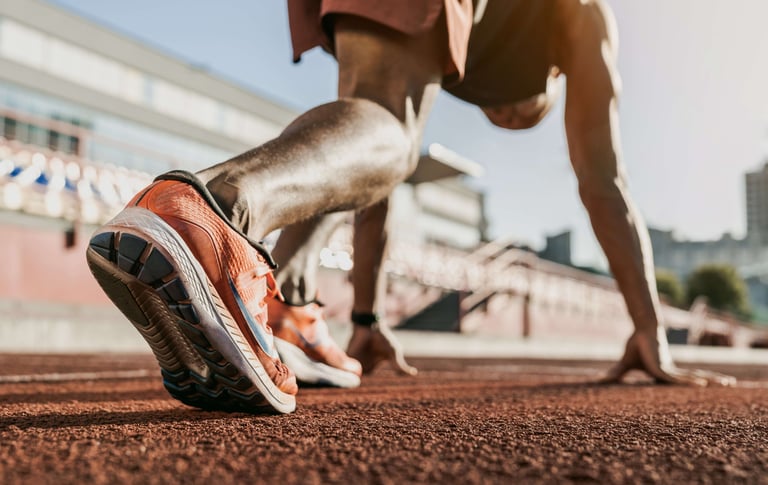Brainspotting: Unlocking Peak Performance
Brainspotting (BSP) builds on principles from Eye Movement Desensitization & Reprocessing (EMDR) to release stress stored in the subcortical brain regions. Its application in sports psychology has exploded in recent years, particularly for performance enhancement.
Athletes at all levels, from weekend warriors to Olympians, turn to BSP to overcome performance anxiety and reclaim their edge. It's especially appealing because it's fast-acting, non-verbal, and uses the body's natural healing mechanism; making it a game-changer in high-stakes situations where every millisecond counts.


Brainspotting Race Car Drivers
Benefits and Outcomes: Drivers report 80–90% resolution of blocks in 1–5 sessions, with measurable results.
Performance Gains: Sharper focus, quicker threat detection, & consistent "flow" states for better lap times and overtakes.
Emotional Resilience: 50%+ stress reduction, plus lower chronic pain via somatic release.
Long-Term Edge: Enhanced neuroplasticity from racing's physicality amplifies BSP's effects, turning it into a mental "upgrade" for career longevity.
In a sports session, a trained practitioner guides you to recall a performance issue, like a nagging injury fear or choking under pressure. Then you work together to find a spot in your visual field that enhances reaction.
Once a "brainspot" is locked in, you hold your gaze there, often with added bilateral brain stimulation like bilateral music or taps. This bypasses the "thinking brain" and dives into the fight-or-flight responses that sabotage athletic flow.
Due to athletes' neuroplasticity from regular exercise, changes "stick" faster, and can yield results in just a few visits.
How Brainspotting Works




Athletes using BSP often describe feeling "lighter" and more present, with tangible gains like better focus under pressure, faster slumps-to-peak transitions and reduced stress (up to 50% in studies).
Research supports this: Small-scale studies show significant performance uplifts and stress drops post-sessions, while neuroplasticity research shows why active bodies respond so well.
David Grand and sport psychologist Alan Goldberg's book This Is Your Brain on Sports (2011) uses BSP to explain cases like Simone Biles' "twisties" at the 2020 Olympics—unprocessed pressure manifesting as disorienting mental fog.
High-profile adopters include pros in golf, tennis, and NASCAR, where split-second decisions rule. Coaches report 80-90% success rates for yips resolution, often in under five sessions.
Proven Benefits + Emerging Evidence


With performance anxiety in sports under the spotlight—BSP offers a stigma-free, results-driven tool. It's mental training that integrates with physical prep or off-season tune-ups.
As one athlete put it after conquering his blocks: "It's like upgrading your brain's software for the game."
BSP isn't about fixing what's "broken"; it's about unleashing what's already there. It's proving that the biggest wins are gained from the mind-body connection.
Why It's Gaining Traction
Curious to try it for a specific sport?
Brainspotting Coaching focuses on performance, confidence, and personal development. It does not diagnose or treat mental health conditions and is not a substitute for psychotherapy or medical care.
Client Experiences with Brainspotting Coaching
"Going from tennis to triathlons felt like learning three languages at once. I was strong physically but mentally scattered, especially during transitions. Richard helped me build a rhythm that carries through every phase of the race. Brainspotting helped quiet the ‘what if I blow this?’ spiral that used to hit me on the starting line. I recently set two PRs and finally feel like a real triathlete."
Evan W., Multi-Sport Athlete
"I’d been on the track for years, chasing lap times and wondering why I wasn’t improving. Working with Richard unlocked something. One Brainspotting session cleared the fear from a crash I had last season. I didn’t realize how much it was holding me back until I passed a car I couldn’t pass before. Now I’m relaxed and enjoying the pace instead of fighting it."
Scott M., Track Addict
★★★★★
★★★★★


Brainspotting Coaching
Focus transcend succeed
Richard Platt, Certified Professional Coach (415) 901-5741 richard@livingvision.pro
